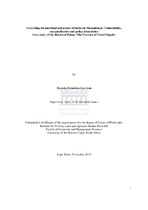Governing the intertidal subsistence fisheries in Mozambique: vulnerability, marginalization and policy mismatches case study of the district of Palma (The Province of Cabo Delgado)
Abstract
Since the earlier 1970s the government of Mozambique has been carrying out legal, political, economic and institutional reforms which are culminating in the establishment of the current fisheries governance systems. An important achievement of these reforms is the political recognition the government has given to the importance of subsistence fishing and its incorporation into policy instruments such as the Fisheries Master Plan II (2014-2019) and the Artisanal Fisheries Development Strategy (2009-2015). In these policy documents, fisheries
authorities put subsistence fisheries on top of priorities. However, the practice in Mozambique’s fisheries is indicating that, despite this recognition, subsistence fishers remain amongst the most vulnerable groups, particularly at district and village levels. The objective of this study is to understand the patterns of inclusion and exclusion of subsistence fishers from the fisheries governance spaces in Mozambique with particular emphasis on Palma district (Cabo Delgado province). The study uses the concept of Action Spaces to situate the nature of opportunities that are being created under these reforms. A critical finding of this study is that, the institutions for fisheries governance being created by the government at district and community levels are not creating a functional mechanism for subsistence fishers to participate, access opportunities, and bring their voices into decision-making systems. As a result, subsistence fishers are creating their own spaces which are based on informal structures and relations to sustain their livelihoods. The
study resorts to the institutional governance insights to understand the factors that may determine the interactions between the formal and informal action spaces while improving the contribution of subsistence fisheries to the livelihoods and food security of the vulnerable groups.

